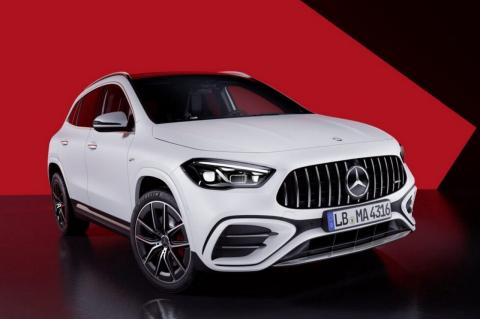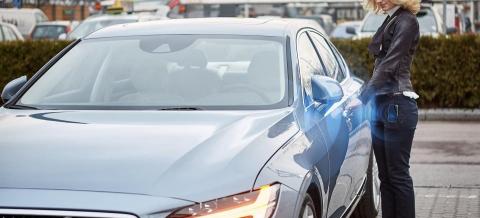With plug-in hybrid mechanics, the Alfa Romeo Tonale becomes the most powerful and efficient model of the Italian house
Its official name is Alfa Romeo Tonale Plug-in Hybrid 4, but on the street it will be better known as Alfa Romero Tonale PHEV and/or Alfa Romeo Tonale plug-in hybrid, so in the following lines we will refer to it by any of the three ways.
Whatever you call it, we’re talking about Alfa Romeo’s first plug-in model. A milestone in the roadmap that the Italian brand has set to meet the challenge of having a 100% electric range in 2027. Before that, if everything goes according to plan, the first car with a 100% electric version will arrive (in 2024) and the first car created from scratch to be electric (in 2025).
Electrification ‘by’ Alfa Romeo
Alfa Romeo has been facing a profound renovation for some time. It faces the challenge of adapting to changing times (and emissions regulations) without this implying giving up the DNA of the brand.
The commitment to a plug-in hybrid as the first electric car in the house is a response to current mobility needs. Studies on the habits of European drivers indicate that, from Monday to Friday, they make journeys of no more than 35 km per day. Slightly less than half, 14 km, are made in urban routes, which means that, if they live in large cities, they need to have a zero emissions or ECO label to access without limitations.
With the launch of the Tonale, Alfa Romeo said that this would be a model that would serve as the engine of the change facing the brand. The dry Tonale bears the label of being the first conventional hybrid of the biscione brand, so it is not surprising that it has been chosen to also be the most efficient model in the history of the house.
We are therefore before a Sport Utility Wagon (SUV) of just over 4.5 meters long and 1.83 high. Only the most astute will notice the only two exterior differences between the combustion and electric versions: the screen-printed biscione on the rear windows and the double chrome exhaust outlet.
The boot, which in the non-plug-in version is 500 liters, sacrifices about 95 liters of capacity to make room for the battery.
Inside
Inside, Alpha vibes are everywhere. The finishes are of high quality and if we had to find an adjective to summarize the impression you receive when entering the cabin, it is balanced. There is nothing on the dashboard that stands out from the rest without this meaning that it is sober or alone. Two digital screens, 10 and 12.3 inches, show the information the driver needs behind the wheel (the first) and give access to the functions of the information and entertainment system (the second).
Following that balance, Alfa Romeo has moved the most important functions off the screen. Air conditioning, volume of the audio equipment… are handled with conventional buttons; something that is appreciated because it facilitates handling without the need to navigate through menus and submenus that force you to take your eyes off the road for longer than recommended.
To object to the interior, I would put two: in the Veloce finish (later we will see what options it goes on sale in) the paddles behind the steering wheel are too large and make it difficult to access the turn signal lever and the central armrest, although it can be moved a few centimeters back, it is somewhat intrusive.
DNA Alfa Romeo
The DNA selector is a wheel placed next to the gear lever (a traditional lever) and gives access to the three driving modes:
-
A (Advanced Efficiency) only the electric motor works
-
N (Neutral) activates the hybrid mode with which the system seeks to increase efficiency by making the best of each technology
-
D is from Dynamics, it adjusts several parameters, including the suspension, for a more sporty use. From this roulette the driver can also choose to disconnect the stability control
We must also talk about the e-save function, which is activated from a button placed next to the gear lever and allows you to manage the battery charge (you can ask the car, for example, to save a certain percentage of charge for when you re-enter an urban environment). From here, the e-coasting technology is also managed, which is responsible for recharging the battery during braking and deceleration.
69 km of autonomy in electric mode
We have had the opportunity to drive the Alfa Romeo Tonale PHEV on the roads of La Rioja and our first impression could not have been better.
The hybrid system is born from the combination of a 1.3-liter MultiAir turbo engine and 180 CV coupled to the front axle. In the rear, goes the electric drive, 90 kW. In this way, it becomes not only the most efficient model in the range, but also the most powerful. In addition to getting all-wheel drive (yes, only while the battery is charged so that the electric motor can work).
The battery is lithium ion and has a capacity of 15.5 kWh. The approved autonomy is 69 km, which can increase up to 80 km in urban use. The figure is more than enough to cover those 35 km a day that we mentioned in the first lines; also to obtain the environmental sticker of the DGT with more benefits, the Zero Emissions.
To recharge it offers two options: in a 3 kW charger you need five and a half hours; in one of 7.4 kW, the waiting time is reduced to 2.5 hours.
Behind the wheel of the Alfa Romeo Tonale PHEV
We have had the opportunity to drive the Alfa Romeo Tonale PHEV on the roads of La Rioja and our first impression could not have been more pleasant. The SUV moves with agility both on the highway and on twisty roads, without losing poise even in curved sections, something to which the good weight distribution (almost 60-40) contributes.
It is noticeable and appreciated that Alfa Romeo has made the effort to pay almost more attention to the power of the heat engine than to the electric one, which means that the change from electric to combustion driving goes completely unnoticed by the driver who does not notice jerks or loss of power. Nor is there an increase in noise when the battery runs out.
Without stepping foot in the city and at 120 km/h in our test we have registered an average consumption of 8.3 liters/100 km without a charge on the battery and 7.5 km/h leaving the Hybrid 4 system to select the best option for each moment.
And if the response on highways is agile so that the car adds kilometers comfortably, on secondary roads it does not lose dynamism, allowing overtaking safely when necessary and facing tight curves without losing poise.
It can be seen that on two-way roads, the lane assistant becomes somewhat more demanding, which, together with a very direct response from the steering, means that the driver has to rectify frequently, without this becoming too intrusive or annoying.
From 51,000 euros
The Alfa Romeo Tonale Plug-in Hybrid 4 is already in European dealerships. It goes on sale in two versions, Ti and Veloce, to which is added a launch edition, Speciale, which will be on the market for three or four months.
Those responsible for the brand assure that they have set the price ensuring that, unless the list of optional equipment becomes very fattening, the client can opt for the aid of the Moves III Plan or the Cambia 360 Plan if they live in Madrid.
Available in six body colors, prices (without discounts) range from 53,000 euros for the Alfa Romeo Tonale Plug-in Hubrid 4 Ti to which the Veloce adds 3,000 euros. The special launch edition has a starting price of 51,000 euros.














